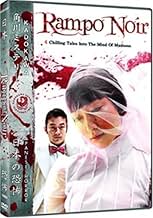VALUTAZIONE IMDb
6,2/10
1217
LA TUA VALUTAZIONE
Questa antologia in quattro parti prende spunto dalla narrativa breve del leggendario scrittore horror Edogawa Rampo.Questa antologia in quattro parti prende spunto dalla narrativa breve del leggendario scrittore horror Edogawa Rampo.Questa antologia in quattro parti prende spunto dalla narrativa breve del leggendario scrittore horror Edogawa Rampo.
- Premi
- 1 vittoria
Ryûhei Matsuda
- Tarô Hirai (story "Imomushi")
- (as Ryuuhei Matsuda)
Nao Ômori
- First Lieutenant Sunaga (story "Imomushi")
- (as Nao Oomori)
Trama
Lo sapevi?
- ConnessioniFeatured in WatchMojo: Top 10 Fantastic Asian Movies You Have Not Seen (2018)
- Colonne sonoreAir du miroir 'Dis-moi que je suis belle' from 'Thais'
Written by Jules Massenet and Louis Gallet
Performed by Usuki Ai and Motosugi Mio
Recensione in evidenza
One of my favorite horror anthology after Subconscious Cruelty (2000), this film is with 4 different directors adapting a Rampo Edogawa story, like most anthology films it's uneven but still fascinating. The only connector is Tadanobu Asano (from Ichi the Killer) in a different role each segment. It blends David Cronenberg with Heroic Purgatory (1970) & House (1977). The movie has almost gialesco vibes, aesthetically and argumentative. I loved "The Caterpillar" episode which is the most grotesque, bizarre and industrial madness.
I più visti
Accedi per valutare e creare un elenco di titoli salvati per ottenere consigli personalizzati
- How long is Rampo Noir?Powered by Alexa
Dettagli
Botteghino
- Lordo in tutto il mondo
- 217 USD
Contribuisci a questa pagina
Suggerisci una modifica o aggiungi i contenuti mancanti

Divario superiore
By what name was Ranpo jigoku (2005) officially released in Canada in English?
Rispondi

























